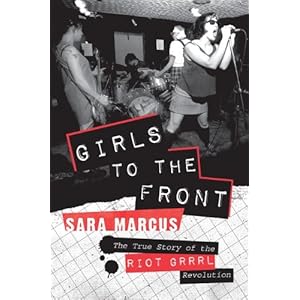As glad as I am to see another book written about third-wave feminism and 90s riot grrrl culture, I wonder where are all the women, children of the 80s and 90s, who came to feminism late, or through other means. (Me? A library card and my two feet, oblivious to a groundswell of female-fronted punk bands.) I know I've been critical of the riot grrrl movement in the past, but Sara Marcus's Girls to the Front looks like a good read, and I hope it addresses the problems of riot grrrl (the cliquishness, the exclusiveness, etc.), along with its successes. From Publisher's Weekly:
"A Brooklyn-based journalist gives a brash, gutsy chronicle of the empowering music and feminist movement of the early 1990s led by young women rock groups like Bikini Kill and Bratmobile. Politicized by such national events as the backlash against feminism in the press, the first Iraq War, and the Supreme Court's gearing up to review Roe v. Wade, young women were incensed."
Johanna Fateman from bookforum described the atmosphere of those early riot grrrl days well in an early review for the book, and I can't help but feel a little cheated:
"Any stab at defining Riot Grrrl still feels dangerous. In its self-mythologizing rhetoric, the revolution belonged to all girls but couldn't be owned or represented by any one. Its work was done in secret, in incremental and internal acts of resistance, as well as publicly through songs, zines, gatherings, and, as a 1992 tour flyer for the bands Bratmobile and Heavens to Betsy announced, "new aesthetics and ways of being." Now, Riot Grrrl struggles to be heard over almost two decades of associations—its influence detected in the emancipatory vibe of female-fronted tween pop and the periodic ascent of a woman rock star. But in the original anthems of Riot Grrrl, "Girl Power" was not the can-do sound track of gymnastic routines. It was the power to confront a rapist, an urgent challenge to the systematic silencing of girls, and the invocation of inconsolable, vengeful, and exhilarated revolutionary states, which would have been as unwelcome in Spice World as they were in The Man's world."
I could have so gotten behind a movement that defined feminism for someone my age, but as a working-class, Midwestern girl in the early 90s, feminism was still an unfashionable relic of my mother's generation: something served with a side order of organic lentils and worn with sandals. I grudgingly identified as one even though I knew no others. I could have used a dose of loud, raw rock with my political awareness. I'm definitely reading this book.


No comments:
Post a Comment